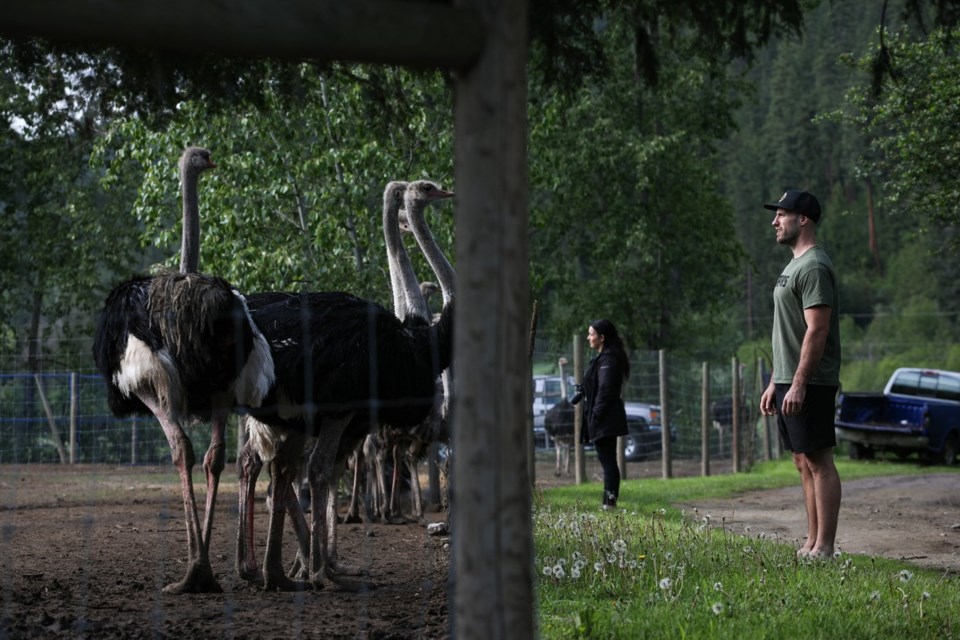Vancouver's Lucas Robinson is making a 575-kilometre trip east to the small community of Edgewood, B.C., with steaks, hamburgers, watermelon and his dog.
The trucker said he feels a responsibility to protect nearly 400 ostriches owned by Universal Ostrich Farms that have been ordered culled after a lengthy court battle that brought international attention to the small community in the B.C. southern Interior.
“I don't know all the ins and outs. That's partly why I'm going up there. But, you know, they're trying to study their antibodies and the eggs and all sorts of things that the big pharma and other interests (groups) don't want happening.” Robinson said.
“There's more going on, and they'll cull those birds over my dead body.”
The Federal Court of Appeal on Thursday rejected the farm's bid to prevent the cull which was originally ordered by the Canadian Food Inspection Agency last December after two dead birds at the property tested positive for H5N1 avian flu.
But their lawyer said Friday they are still holding out hope that Canada's top court will hear the case, and the farm's spokeswoman has urged supporters to converge on the farm to protect the birds.
The cull order has drawn opposition from U.S. officials, including Health Secretary Robert F. Kennedy Jr. and former TV personality Dr. Mehmet Oz, now the administrator of the U.S. Centers for Medicare and Medicaid Services, and led to protesters camping out at the farm earlier this summer.
A total of 69 birds died at the farm in December and January, and while the farmers say the flock is now healthy, the CFIA says the cull is necessary because exposed flocks create an opportunity for the virus to mutate.
Lawyer Umar Sheikh said in an interview that he was working with Universal Ostrich Farms on an application to the the Supreme Court of Canada for another stay of the cull, pending an application seeking leave to appeal.
He acknowledged the threshold to have a case heard by the top court is high and said it was too soon to discuss what arguments they intend to make.
"Generally, it's a very high threshold. You have to seek leave and the leave application, in and of itself, is fairly significant in terms of a piece of work," he said.
"You're trying to demonstrate to the court that it's worthy of them intervening to consider the legal issues, or that there are unsettled issues within the factual context of this case which would warrant their review and intervention."
The Supreme Court of Canada only hears cases that it considers to be of public importance and to have national significance.
Statistics in its latest annual report show the Court received 526 applications for permission to appeal in 2024 and only 32 applications were granted that year.
Supporters of the farm such as Robinson meanwhile say they are heading to the property to show support.
Farm spokeswoman Katie Pasitney, whose mother co-owns the property, had called for supporters to go to the property and "sit with animals that need protection" from the cull.
She has said Canada needs to "rise up" against the move, but encouraged protesters to be "peaceful only."
Posts on a social media group administered by Pasitney showed people saying they were booking flights or driving to the property.
Others suggested a convoy or appealing to officials in the United States to have the birds moved there.
However, a spokesman for Federal Health Minister Marjorie Michel said Friday she had not been in touch with any U.S. counterparts.
Robinson, who grew up in a horse stable in Ladner, said he had a “very loving connection” with animals.
“And these ostriches are iconic, majestic birds. They're not a flock of chickens or something, right? Like, these things live decades, and they have personalities,” he said.
The CFIA has said there are "ongoing risks" to animal and human health as well as export market access for Canadian goods.
It says in a statement about the Court of Appeal ruling that it won't discuss operational plans, but in a May 30 update that remains on its website, it says it "continues planning for humane depopulation with veterinary oversight at the infected premises."
This report by The Canadian Press was first published Aug. 22, 2025.
Ashley Joannou and Nono Shen, The Canadian Press




